The Blackhead Persian sheep is a breed of domestic sheep which was originated from South Africa. It is a fat-tailed breed and raised mainly as a meat sheep breed for meat production. It is also known as Swartkoppersie. The breed is a direct descendant of the Somali sheep and is originally from Somalia (actually from the Somali inhabited areas of the Horn of Africa). It is also a type of hair sheep breed, that means these animals do not grow wool. And they can tolerate heat better than wool sheep breeds.
The Blackhead Persian sheep actually originated from Somalia, despite it’s name. It was imported into South Africa in about 1870. In the year of 1906, a South African studbook was set up, and there were around 4000 registered animals by 1930.
The breed was crossbred with local sheep breeds and also was improved by crossing it with such sheep breeds as the Dorper. There were estimated to be 2 million Blackhead Persian sheep in South Africa in the 1950s. These animals have also been introduced to Kenya, Ghana, Ethiopia and Tanzania.
The Blackhead Persian sheep breed has also been imported into the Caribbean region, Central and South America for cross-breeding purposes. It is recognized as an official breed by the Brazilian Sheep Breeder’s Association. Today the breed is raised mainly for meat production. However, read some more information about this sheep breed below.
Origin And History Of Blackhead Persian Sheep
The Blackhead Persian Sheep has a long history. They were originated from South Africa, and are well-known for their distinct black head and white body. Many people have been raising them for their wool and meat from a very long time.
They have spread to other parts of the world over time. And today they are valued for their hardiness and adaptability to different climates. Currently, these sheep can be found in various countries throughout the world.
Characteristics
The Blackhead Persian sheep are small to medium sized animals. They are mainly white in coloration. But as the name suggests, their head is of black color. Their ears are long and pendulous, and the neck is also black. The rump and the base of the tail have an accumulation of fat. Both rams and ewes are generally polled. Both rams and ewes weight around 2.6 kg at birth. Average live body weight of the mature Blackhead Persian rams is around 68 kg. And the mature ewe’s average live body weight is around 52 kg.
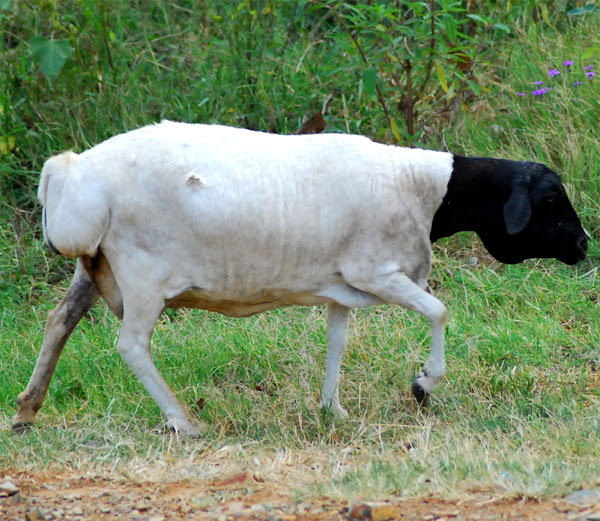
Dietary Requirements
Like many other domestic animals, feeding the Blackhead Persian sheep is the most important part of their caring. They have specific dietary needs, and they mainly eat grass, hay, and other plants found in their environment. Always try to provide them with very good quality pasture. Also supplement their diet with minerals and salt blocks to ensure they get all the nutrients they need. Also ensure availability of enough clean and fresh drinking water at all times.
Housing Requirements
Like many other sheep breeds, the Blackhead Persian sheep also need proper housing system to stay safe and healthy. These goats require secure and comfortable shelter from harsh weather conditions (like rain, wind, and extreme temperatures). A well-ventilated barn or shelter with clean bedding is essential to keep these animals comfortable. Ensure that their housing is spacious enough, and doing this will allow the sheep to move around freely and live comfortably. Clean their house on a regular basis to prevent the buildup of waste and reduce the risk of disease and other health problems. Also ensure access to fresh water and ample food supply depending on their demand.
Breeding/Reproduction
Like many other domestic sheep breeds, the Blackhead Persian sheep are excellent breeders. They will breed easily and produce kids if you keep good ratio of male and female sheep in your farm. The breeding season of these sheep usually occurs in the fall or early winter when the ewes are in heat. You can use natural mating or artificial insemination techniques to impregnate the ewes.
Pregnancy in Blackhead Persian ewes lasts around five months. And during this time, the ewes require proper nutrition and veterinary care to ensure a successful pregnancy. After giving birth, the lambs require special caring by their mothers and monitored closely for growth and good health.
Health Management
The Blackhead Persian sheep is generally a strong, hardy and healthy breed. Perform regular health check-ups by a veterinarian. Vaccinate the animals timely to protect them from common diseases and health problems. Provide them with proper nutrition, including a balanced diet and access to clean and fresh water. And doing this will help to supports their immune system and overall health.
Regular grooming helps to prevent skin problems and keeps their wool clean and healthy. And providing a clean and well-ventilated living environment reduces the risk of respiratory infections.
Hardiness
Blackhead Persian sheep are well-known for their hardiness. They can withstand various environmental conditions and have adapted to survive in different climates (from hot and dry regions to cold and mountainous areas). Their thick wool helps to regulate their body temperature, and this helps to keep them warm in winter and cool in summer. They are also resilient against common sheep diseases and parasites. And this feature makes them easier to care for.
Behavior/Temperament
Blackhead Persian sheep are known for their docile temperament and gentle behavior. They are calm and generally non-aggressive, and they are easy to handle and manage. They often prefer to graze peacefully in the pasture. And they tend to stick together in a flock. They are sociable animals that enjoy the company of other sheep and may form strong bonds within their flock.
Caring
Caring for Blackhead Persian sheep is relatively easy and simple. Their caring tasks includes giving them access to fresh water, nutritious food, and a safe and comfortable living environment. Perform regular grooming, and doing this helps to keep their wool clean and prevents skin problems. Monitor their health on a regular basis and seek veterinary care when needed.
Lifespan
Average lifespan of the Blackhead Persian sheep varies between 6 and 12 years.
Uses
The Blackhead Persian sheep is a meat sheep breed. It is raised mainly for meat production.
Price
Blackhead Persian is a popular sheep breed among farmers and breeders in their native area and also in many countries around the world. They are mainly popular for their unique appearance and valuable traits. Although, it is very tough for us to tell the exact price. Because exact price of these sheep can vary from place to place, and depends on numerous factors. Contact your local breeder to know more about their current price.
Pros and Cons of Blackhead Persian Sheep
Like many other sheep breeds, these sheep also have some pros and cons. Here is a list of the pros and cons of Blackhead Persian Sheep:
Pros:
- Hardy and active animals
- Gentle temperament
- Distinctive appearance
- Valuable for both small scale and commercial farming
- Sociable
Cons:
- Coarse wool
- Regular grooming needed
- Susceptible to diseases
- Maintenance
- Initial cost
Special Notes
The Blackhead Persian sheep are well adapted to their local climates. Previously they were bred mainly for the large quantity of fat stored in the tail region which gave resilience in arid conditions and which was prized for cooking. The ewes are pretty good mothers, and they lactate for approximately 84 days. They produce around 50 kg of milk in their lactation period, and their milk contain around 5.9 percent fat.
Average litter size was 1.08 in the Caribbean region. Today these animals are raised mainly for meat production. However, review full breed profile of the Blackhead Persian sheep in the following chart.
| Breed Name | Blackhead Persian |
| Other Names | Swartkoppersie |
| Breed Purpose | Meat |
| Special Notes | Well adapted to local climates, previously breed mainly for the large quantity of fat stored in the tail region, the ewes are pretty good mothers, produce enough milk for their lambs, milk is of good quality containing around 5.9 percent fat, average litter size is 1.08, today raised and prized for meat production |
| Breed Size | Medium |
| Weight | Mature ram’s average body weight is around 68 kg, and the mature ewe’s average live body weight is around 52 kg. |
| Horns | No |
| Climate Tolerance | Native climates |
| Color | White with black face |
| Rarity | Common |
| Country/Place of Origin | South Africa |
Frequently Asked Questions (FAQs)
People ask many questions about Blackhead Persian sheep. Here we are trying to list the most common questions about blackhead Persian sheep, and trying to answer them. Hope you will find your answer. Don’t hesitate to ask us if you have more questions.
Which sheep breed has a blackhead?
The Blackhead Persian sheep has a blackhead which was originated in the arid regions of east Africa (which is now called Somalia).
Why do some sheep have black heads?
Any sheep can have a black face if it gets those genes from it’s parents. Both wool type sheep and meat type sheep can have black faces. The Blackhead Persian is such a breed which has black heads?
What are Persian sheep used for?
The Blackhead Persian sheep is raised mainly as a meat sheep breed for meat production purpose.
Any Blackhead Persian sheep for sale near me?
Not sure! Please search your local livestock market or search your local classified websites.
What are the main characteristics of Blackhead Persian sheep?
The Blackhead Persian sheep are small to medium sized animals. They are mainly white in coloration. But as the name suggests, their head is of black color. Their ears are long and pendulous, and the neck is also black. The rump and the base of the tail have an accumulation of fat. Both rams and ewes are generally polled. Both rams and ewes weight around 2.6 kg at birth.

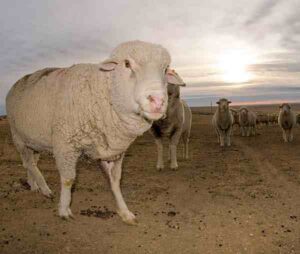
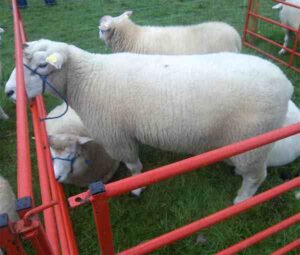
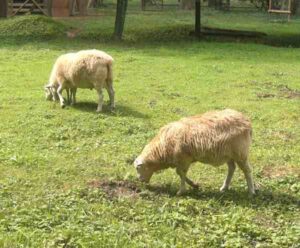
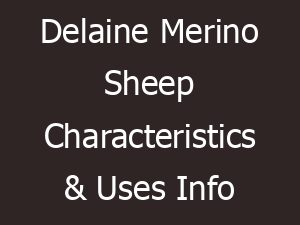
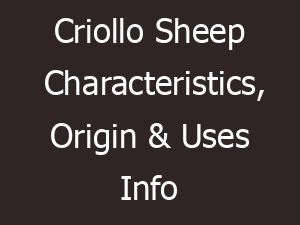
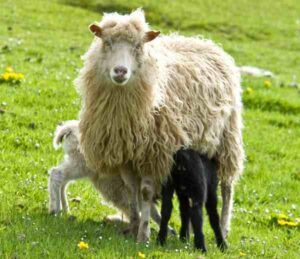
Good morning,
I have a couple sheep that have fat tails but not split as in the pictures. Is there anyone who can help me identify my ram and let me know how much he is worth?
Thanks in advance
Please send us photos of your sheep to [email protected]